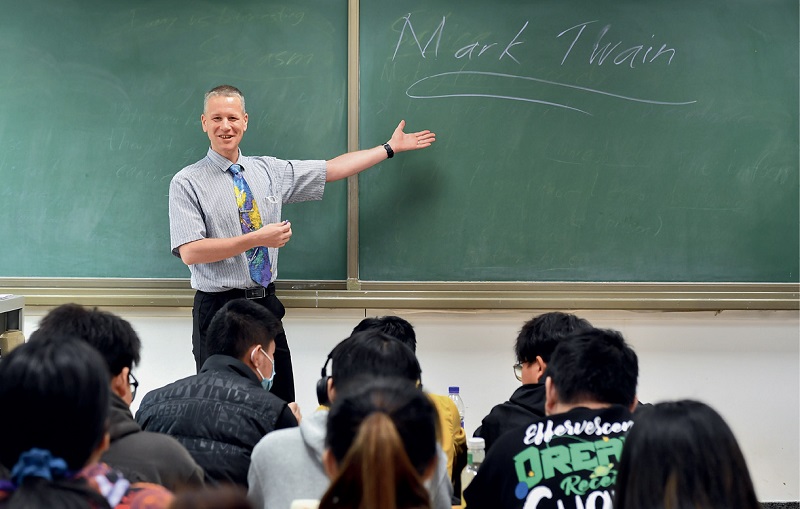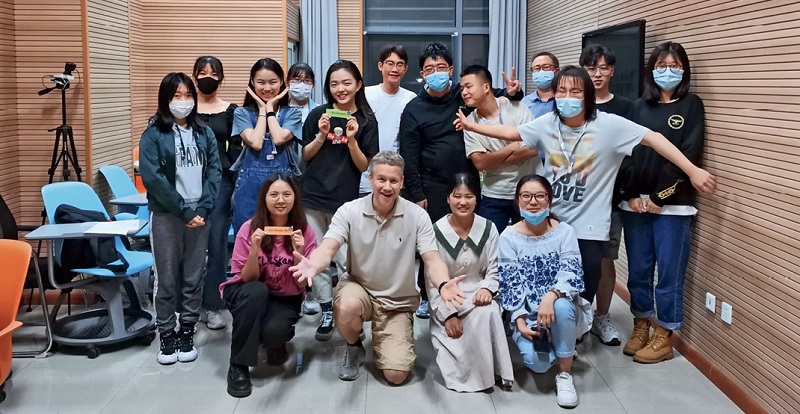A Swedish dream chaser’s life adventure in Beijing.

Thomas Karlsson is teaching an oral English class for sophomore students from the Teacher’s College at Beijing Union University (BUU) in 2022.
Vzzt! Vzzt! It is 4 a.m., and the vibration of his Amazfit smartwatch rouses Thomas Karlsson from his sleep. It is time to pledge the small sum of money he donates daily to charity, then head out for his 6-km morning walk, followed by some last-minute lesson preparations before class which starts at 8 a.m.
Karlsson, a Swedish teacher at Beijing Union University (BUU), has been living in China for over 15 years. The seeds of his China journey were sown when he enrolled in a program for East Asian studies at Lund University in Sweden in 1997. Back then, cell phones hadn’t yet come into vogue and even the Internet was not widely used. Learning Chinese meant using textbooks, hefty dictionaries, and audio cassettes. He would pore over the dictionary for hours to decipher a one-page Chinese article.
“In those days, it was a real challenge,” he said.
China had not become the world’s second largest economy yet, and learning Chinese didn’t mean business rewards or job opportunities. However, he could sense the huge potential, especially when he learned Chinese and attempted to understand the Chinese culture. In 2006, with a laudable score in the official Chinese language proficiency test, he won a scholarship for a five-week summer program at Beijing Language and Culture University. This meant he would be finally able to visit the Forbidden City and the Summer Palace, of which he had heard so much. Little did he know that the short stint would lead to a Beijing adventure lasting almost two decades.
Chasing a Dream
After finishing the study program, Karlsson was offered a Beijing-based job as a market researcher. In 2008, the year Beijing successfully hosted the Summer Olympic Games, he got married. In the next year, he started to teach business at BUU. “Teaching turned out to be my true calling in life,” he said.
Life in Beijing has been an amazing adventure, especially as a frontside witness to the tremendous changes China has undergone. It has also provided him with numerous opportunities for personal growth. “If I hadn’t come to Beijing, I would never have had the chance to teach the range of subjects that I do, and meet so many students from different backgrounds,” he said. Today, thanks to high-speed broadband and 5G, he can connect with students at BUU’s partner universities in Russia, Montenegro or Mexico while riding on the Beijing subway.
“When you open your eyes to these great undertakings, it is impossible not to want to be part of them or at least support them somehow,” he said.
Despite his busy teaching days, Karlsson applied for a full-time scholarship at the University of International Business and Economics in Beijing. In 2022, he obtained his Ph.D. in economics. “I was particularly interested in blockchain technology, and I know that China is quickly becoming the leader in blockchain applications outside the cryptocurrency space. So, I wrote my dissertation in this area,” he said. He was 44 at that time.
“There is always time to pursue your dreams unless you decide to give up,” he said. “Taking on seemingly impossible challenges and also helping those around you are what makes life worth living.”
Inspiring Young Minds
Meeting or even exceeding the ever-increasing demands of his students is what drives Karlsson forward. As the course leader of an international business program at BUU, he spends hours in designing courses in business and economics. He also trains students to do competitive business simulation.
The idea comes from GLO-BUS, a web-based business simulation game created by two American professors at the University of Alabama. In the game, the students virtually run a multinational company that produces goods for the global market. They have to plan production, marketing, and financing and make decisions for the company, in direct competition with other teams around the world. Compared to traditional classroom instructions, these simulation games are more hands-on in getting students to solve real business issues. As the instructor, Karlsson changes his teaching approach from lecturing to more hands-on coaching and the reward is seeing the students grow in confidence and entrepreneurial capabilities.
The Chinese government has been encouraging people to start businesses and pursue innovation. Karlsson is also encouraging his students to start their own businesses. The results include creative ideas getting translated into reality with the development of new brands. One example of that is the Iris Cake. Karlsson calls it the BUU incubator’s most successful start-up product. It offers artistically designed birthday cakes, marketed exclusively through WeChat to keep advertising costs down.
Karlsson mentors students on designing their business model, establishing a loyal customer base, and conducting market research to find customer preferences. All these efforts are designed to make them more competitive than their counterparts elsewhere.
The Chinese government understands that besides creative thinking and the willingness to take risks, young entrepreneurs also need a support system with favorable policies. To ensure that, start-up incubators have been set up at universities and innovation clusters at the city level. As the infrastructure for entrepreneurship expands and improves, so will the number of young people who dare to start their own business and pursue their dream.

Karlsson is taking a group photo with students at the Spark Club, a weekly club which equips participants with skills in debating and making presentations.
Essence of the Chinese Spirit
At the height of the pandemic in 2020, Karlsson met a group of dedicated blood donors, some of whom had given blood hundreds of times. Their experiences and the urgent need for blood at the time inspired him to become a regular blood donor. He says such down-to-earth and mostly unreported acts of philanthropy are the essence of the Chinese spirit.
“Chinese society makes it so easy and rewarding to give,” he said. With just a tap on his smartphone every morning, he can participate in tech giant Tencent’s online fundraising initiatives aiming to help people in need. He can contribute to planting trees in the deserts of Inner Mongolia and Xinjiang and preserve the oceans by doing little tasks daily, such as collecting green energy points on the mobile payment platform of Alipay. “These are all good ways to participate in public welfare and charity,” he stressed.
He takes out his phone and shares his “Little Red Flowers” on the Tencent Public Welfare app. Founded in 2018, this charitable program was originally intended to record users’ public welfare behavior so that every good deed, however minor, could be recorded and encouraged. Donating a “Little Red Flower,” you can contribute to charitable projects which include protecting the biodiversity, caring for the elderly in rural areas, and helping rural children visit museums. Donors decide which program to support based on their own interests.
“The Internet public welfare model is an undertaking that the Chinese government and enterprises have innovated on smartphones, which has profoundly changed the way we do charity,” Karlsson said. Chinese people value doing good deeds daily and these daily public welfare activities can set examples for society.
Karlsson points out that economists tend to focus on the role of the government in resource allocations, but sometimes forget the crucial role of the government in deciding the right “rules of the game” and guiding markets by using incentive. The Chinese government encourages enterprises to contribute to social welfare and environmental protection, and he says this system design is worth learning.
Today, digitization and artificial intelligence are essential trends in the development of technology. China’s large population ensures the scale of digitization. As a new phenomenon, digital public welfare is increasingly demonstrating its vitality and appeal. The government gives great importance to integrating digital public welfare with ecological civilization construction, thereby promoting green transformation, which is an unprecedented, systematic, and historic transformation.
Karlsson’s philosophy is simple: For a better life for people. To realize it, the Chinese spirit, Chinese wisdom, and Chinese solutions are critical. “This beautiful planet of ours requires everyone’s participation for its sustainability and development,” he said.